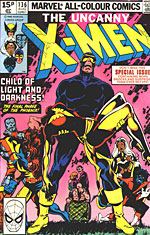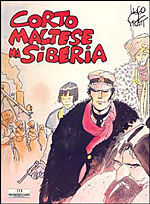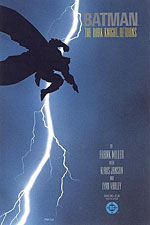>> Beyond Borders: Mondo Loco
>> Beyond Borders: Every Picture Tells A Story
More...

Over the past three years, Spanish writer Marcos Castrillón has provided Ninth Art with one of its most unusual series, Beyond Borders. The thirteen essays look beyond the confines of the English-speaking comic market and the increasingly familiar manga scene to uncover some of the lost treasures of Europe and South America. The series has looked at such gems as Lewis Trondheim's APPROXIMATIVEMENT, Argentina's blockbuster strip MAFALDA, and the work of Europe's master creator, Hugo Pratt. Now Marcos reveals the nine comics from all around the world that mean the most to him.
UNCANNY X-MEN
Chris Claremont, John Byrne et al
 My comic book obsession. It all started here. Chris Claremont. John Byrne. The Dark Phoenix Saga. Sure, there were a few comics before; THE KORVAC SAGA, Jones and Anderson's KA-ZAR, Mantlo and Golden's MICRONAUTS. All great and they all made me come back for more But this? This was ridiculous fun. A soap opera with tons of action, strong characterisations and two creators at the top of their game. No matter how passé the book may look nowadays, UNCANNY was the perfect example of how enthralling franchised American mainstream comics can be, especially when read from the perspective of youth. A real tour de force of unlimited imagination and thrill ride action.
My comic book obsession. It all started here. Chris Claremont. John Byrne. The Dark Phoenix Saga. Sure, there were a few comics before; THE KORVAC SAGA, Jones and Anderson's KA-ZAR, Mantlo and Golden's MICRONAUTS. All great and they all made me come back for more But this? This was ridiculous fun. A soap opera with tons of action, strong characterisations and two creators at the top of their game. No matter how passé the book may look nowadays, UNCANNY was the perfect example of how enthralling franchised American mainstream comics can be, especially when read from the perspective of youth. A real tour de force of unlimited imagination and thrill ride action.
THE BIRTH CAUL
Alan Moore and Eddie Campbell
One week after my mother died, I opened a package delivered to me from Australia. Eddie Campbell had promised, after meeting him at a Madrid Con where I worked as interpreter, to send me his latest work with Alan Moore.
I opened the package, skimmed through it, then sat down ready to immerse myself in some sweet and dearly wanted oblivion. A few pages in I reached Moore's telling of his own mother's death, and there was one single panel, of him with his mother in his arms, that I found agonising. I remember collapsing on the floor, crying, letting it all go after weeks of holding the tears inside like a cancer.
Was it the timing? Maybe. But the strength of those pages is overwhelming. Moore's prose chokes your soul, and Campbell's drawings illustrate all that is beautiful yet terrible in life.
WATCHMEN
Alan Moore and Dave Gibbons
A predictable choice? Maybe, but also an unavoidable one. After all, this is the work that brought superhero comics to the spotlight and offered them a critical reappraisal. WATCHMEN made comics them adult, respectable, mature. But the book's importance doesn't really lie in what it represented or achieved, but in what it is.
WATCHMEN is a work of absolute genius, and every single time you read it you can discover another level of text, metatext or subtext. Dave Gibbons and Alan Moore's masterpiece could hold its ground and stand comparisons with any of the greats of high literature. It's simply the best American comic ever produced. Maybe even the best comic full stop.
CORTO MALTESE IN SIBERIA
Hugo Pratt
 There's a rule among some writers that states that in order to write about something, you have to first experience it. Hugo Pratt certainly seems to have lived everything he wrote about. He fought both for the Axis and Allied forces during World War II, travelled around the world, and loved, hated, smoked, and drank like there was no tomorrow.
There's a rule among some writers that states that in order to write about something, you have to first experience it. Hugo Pratt certainly seems to have lived everything he wrote about. He fought both for the Axis and Allied forces during World War II, travelled around the world, and loved, hated, smoked, and drank like there was no tomorrow.
CORTO MALTESE is his testament to the good life he lived. The series offers a slightly deformed view of the world. You could even call it romanticised. The hero is a sexy, cynical anarchist, the heir of the tragic romantic heroes of the 19th century who enamoured a generation of readers. And Corto Maltese is an icon who never shined brighter than in SIBERIA, a book full of grand themes and exuberant characters. SIBERIA is a record of an age long gone, when ideologies mattered and the world was a grim but beautiful and amazing place to live.
MONSTER
Naoki Urusawa
On the internet, it's a sentiment whispered everywhere. Do comics suck now? Are they immersed in a creative crisis? Where's the next WATCHMEN, the next DARK KNIGHT?
Don't fret; it's not comics. It's just superhero comics. The Franco-Belgian and Japanese markets keep churning out strong comics on a regular basis. Sometimes even masterpieces, like Naoki Urusawa's MONSTER.
What starts like a slight variation on THE FUGITIVE turns quickly into a metaphor for life and how the choices we make guide us or send our lives spinning out of control. Wrapped in a labyrinthine plot and strong characterisation, MONSTER twists and turns at breakneck pace. It's a thrilling tale, and clear proof that there's life outside American comics - and there are still hungry creators out there with things to say and great tales to craft.
PUNISHER: THE SLAVERS
Garth Ennis and Leandro Fernandez
Excessive, flawed, nihilistic, iconoclastic; nonetheless, Garth Ennis is one of the most important comic writers of the 90s. Ennis managed to single-handedly re-energise DC's Vertigo imprint with PREACHER, an enthralling mixture of the violence, sex and chaos that has become his trademark.
Pundits often criticize the Irishman's lack of range. He does tend to always focus on the same grand themes of war, friendship, love and tragedy, usually splashed with hefty doses of scatological comedy. But can we blame Ennis for knowing is limitations and focusing on the themes he knows he can handle best? Shouldn't we instead praise him for his ability to always give another turn to the screw to his chosen genres?
His PUNISHER surely grants such a pass. It's one of the most brutal comics I've ever read, and Ennis has managed to upstage himself with every new story featuring Marvel's mob-gunning psycho, upping the violence and viciousness with every new arc - SLAVERS being the latest and best. A rollercoaster of evil and bleakness, it contains one of the most soul wrenching, painful and desolate endings ever, in any medium.
ADOLF
Osamu Tezuka
Reading Osamu Tezuka is a toughie. The manga maestro really created manga out of nothing but a deep love for Disney comics and prehistoric American funnies, so his comics language, notably flavoured by his Japanese sensibilities and his love for contemporaneous metatext, can be disorienting for the unaware modern reader, unless he's armed with a reading guide.
There is undoubtedly genius in Tezuka's other great works, BUDDAH and PHOENIX, but it can be a struggle to discover it. ADOLF is something else entirely. The story of two German brothers before and during World War II, and of the relationships to Adolf Hitler; it's clear-cut and easy to follow - a real Tezuka for beginners - yet still a work of mesmerising genius. Forget what you may have heard about Tezuka's weirdness, and give ADOLF a try.
BATMAN: THE DARK KNIGHT RETURNS
Frank Miller
 This and WATCHMEN are, of course, the two works that changed the face of American comics forever. But while Moore's strongest traits lie in the substance and subtleties of his work, Frank Miller's strengths lie in his pure, sheer mentalism and brute power. We always knew Batman was an amazing character, but it was not until DKR arrived that we realized exactly how magnificent he could be. And it's a testament of the strength of the book that there's not a single Batman comic that have ever come close to matching its standard.
This and WATCHMEN are, of course, the two works that changed the face of American comics forever. But while Moore's strongest traits lie in the substance and subtleties of his work, Frank Miller's strengths lie in his pure, sheer mentalism and brute power. We always knew Batman was an amazing character, but it was not until DKR arrived that we realized exactly how magnificent he could be. And it's a testament of the strength of the book that there's not a single Batman comic that have ever come close to matching its standard.
Around a fairly plain and conventional story, Miller reimagines Batman as an avatar for everything that's righteous and macho in the world. Batman is an unstoppable power, the embodiment of liberal rage armed with conservative tactics and more one-liners than a Shane Black script - plus a penchant for maiming and causal rearrangement of his enemies' limbs. The epitome of cool.
MORT CINDER
HG Oesterheld and Alberto Breccia
A comic as immense as the creators behind it. The artist, Alberto Breccia, drew comics for 70 years in Argentina and Europe, and died at 92, literally with a pencil in his hand, leaving a legacy of greatness behind him. The writer, HG Oesterheld, single-handedly transformed South American comics from a teen affair to an adult business, preceding not only the maturing of the North American scene, but also the French market's efforts to drop the stain of fluffy, toothless entertainment. Oesterheld turned comics into something important, meaningful and dangerous. And he paid for it with his life.
At first bearing the influences of Lovecraft, Poe, 50s whimsicality and Cold War American terrorvision, MORT CINDER gradually into something more, a parable of the inner violence and terror of human life - a parable of life itself, you could argue. It's as if Oesterheld suddenly realised that true terror doesn't lie in our fantasies, no matter how dark they are, but in our nature as human beings.

This article is Ideological Freeware. The author grants permission for its reproduction and redistribution by private individuals on condition that the author and source of the article are clearly shown, no charge is made, and the whole article is reproduced intact, including this notice.


